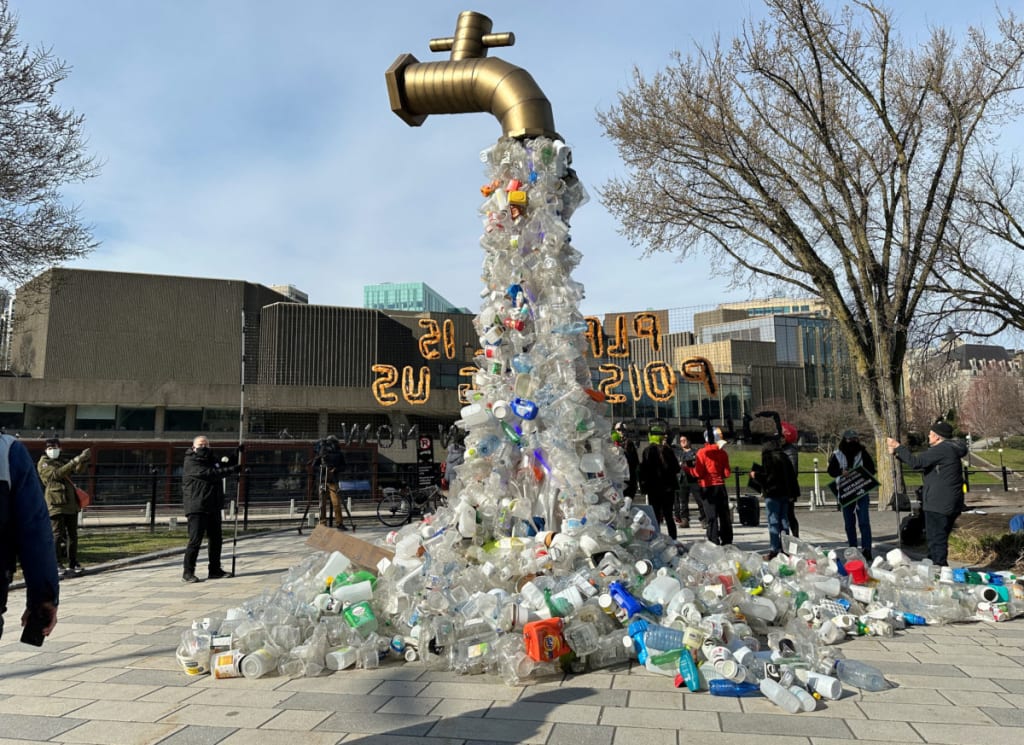
This week, thousands of observers and negotiators from most of the world's countries are assembling in Ottawa, Canada, to draft a treaty to halt the rapidly worsening issue of plastic pollution.
According to the United Nations Environment Programme, plastic waste is dumped into rivers, lakes, and oceans worldwide on a daily basis in an amount equal to 2,000 garbage trucks. Tiny plastic particles are being consumed, breathed, and drunk by more people.
The current treaty draft needs to be streamlined, and the scope of the agreement must be determined. Will it restrict certain chemicals used in plastics, limit plastic production, or prioritize human health and the environment? A group of nations calling themselves the "high ambition coalition" want to see these components.
As some of the producers of plastic and exporters of oil and gas would prefer, the agreement could instead have a more constrained scope and concentrate more on recycling and plastic waste.
175 countries decided in March 2022 to create the first legally-binding agreement on plastic pollution, which includes ocean pollution, by the end of 2024. The incredibly short negotiation timeline is intended to reflect how urgent the issue is. The Intergovernmental Negotiating Committee for Plastics at the UN is holding its fourth of five meetings.
According to Inger Andersen, executive director of UNEP, "it's a once-in-a-lifetime opportunity to fix something that everyone knows needs to be fixed because plastic in the environment is not natural."
People all across the world find what they see repulsive. The whale loaded with fishing gear, and the straw in the turtle's nose. We really don't want to live in this world, she remarked in an interview.
Andersen disproved the notion that the process is "anti-plastic" because plastic benefits society in a variety of ways. However, she stated that the treaty ought to do away with needless single-use, transient plastic items that are frequently burned, buried, or disposed of.
Global plastic production is expected to increase further and, in the absence of any changes, double or triple by 2050.
The federal Lawrence Berkeley National Laboratory's researchers released a report last week that looked at the impact on climate change.
They came to the conclusion that greenhouse gas emissions from the process would more than double if production grew conservatively. The so-called global carbon budget, which is the amount of carbon emissions that can be produced between now and 2050 while staying at or below the international goal of limiting warming to 1.5 degrees Celsius (2.7 degrees Fahrenheit) since the 1850s, could be used in this way, amounting to 21 percent to 26 percent.
Fossil fuels are used to make most plastic. COP28 negotiators at the United Nations climate talks last December decided that the world needs to triple its use of renewable energy sources and move away from fossil fuels, which warm the planet.
However, oil and gas companies have been looking more to the plastics side of their business as a lifeboat, a market that could grow, as pressure to reduce fossil fuels has increased.
According to Björn Beeler, the international coordinator for the International Pollutants Elimination Network, the main obstacle to the negotiations is that the major oil and gas producing nations do not want a treaty that restricts their capacity to extract and export fossil fuels for the production of plastic. IPEN is calling for a treaty that would stop the rapid expansion of plastic production and impose worldwide controls on dangerous chemicals found in plastics.
"Everything revolves around production, which explains why things are moving slowly. And it will become extremely powerful," he declared. "Oceans are not the issue. More important is the oil.
Leading a congressional delegation to Ottawa, U.S. Sen. Jeff Merkley of Oregon is pushing for a robust treaty. Thus far, Merkley stated, the U.S. government has maintained that voluntary measures by other countries to reduce plastic pollution are insufficient to bring about change.
"We are a fossil gas country, which is the fundamental reason why the United States is not ambitious," he stated.
ExxonMobil is producing more plastic. Karen McKee, the president of the International Council of Chemical Associations and the ExxonMobil Product Solutions Company, stated that it is a valuable and practical material that enhances people's lives globally and ought to take the place of other materials that release more greenhouse emissions.
That does not imply that we are not worried about environmental plastic waste. We certainly must address that matter," she remarked. "However, I would distinguish the need to manage end-of-use plastic and to increase circularity from the production of plastic."
Through a procedure known as chemical recycling, ExxonMobil was able to break down over 45 million pounds of plastic waste at its expansive complex in Baytown, Texas, last year, according to McKee. It intends to give many of its other manufacturing locations around the world this capability.
McKee was supported by Chris Jahn, president and CEO of the trade group for the industry, the American Chemistry Council. According to him, the goal should be to eradicate plastic pollution without sacrificing the advantages of plastic.
Rivalries came into sharp relief when the Uruguayan treaty negotiations got underway in December 2022. Certain nations advocated for international mandates, while others pushed for domestic voluntary solutions. During the May 2023 Paris talks and the November Nairobi talks, progress was sluggish.
However, according to Alexis Jackson, who will head a delegation from The Nature Conservancy in Ottawa, there is still time to move forward with an ambitious treaty. To stop plastic pollution, the Nature Conservancy, Greenpeace, and other environmental organizations think the treaty should cut back on the quantity of plastic produced and used.
"We have a substantial amount of work ahead of us, as we are over halfway through the process," Jackson stated. "However, I believe that even in the face of difficulty, change is possible."
Andersen, at the UN, is also hopeful that this fall's final meeting in South Korea will result in a significant treaty.
She declared, "Everyone wants this treaty." "This is something that the world needs, a solution."





Comments
There are no comments for this story
Be the first to respond and start the conversation.